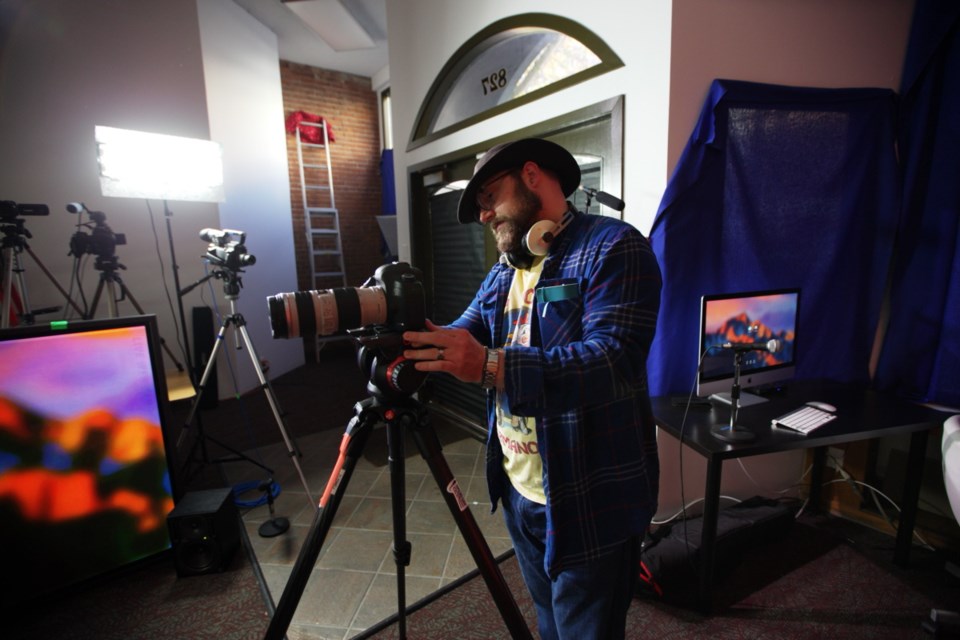As if the local gaming community wasn’t pumped enough about the 10th anniversary of Desert Bus for Hope, this year’s edition of the international charity gaming marathon will be featured in a new documentary.
Before local volunteers even start geeking out for Desert Bus for Hope, which begins broadcasting at 10 a.m. Saturday from a downtown venue, the cameras are already rolling for the film.
We Are Desert Bus, directed by North Carolina-based filmmaker Russ Pitts, will document the history of the pop-culture phenomenon launched in 2007 by LoadingReadyRun. The Victoria-based online comedy troupe and video-production company was co-founded by Graham Stark and Paul Saunders.
“Hopefully, this documentary will help, but I think there’s a lot of people who still don’t understand what we do,” Stark said.
Desert Bus for Hope began when Stark’s colleague James Turner suggested they do something to galvanize gamers globally to help Child’s Play, a Seattle-based charity that improves the lives of children in hospitals and domestic-violence shelters.
Saunders suggested they started streaming something amusing related to Desert Bus, the unreleased 1995 tongue-in-cheek video game conceived by American illusionists Penn and Teller.
For about a week each year, gamers work in shifts playing “the world’s most boring video game” around-the-clock. The goal is to drive a virtual bus for eight hours at 72 km/h from Tucson to Las Vegas. If you stall, you’re towed back and must start over.
Penn Jillette and his partners hatched the video-game concept as a satirical weapon against critics of video games, notably Janet Reno, the former U.S. attorney general, who died on Monday at age 78. “They heard the government talking about how video games were evil and bad for children,” Pitts recalled. “He remembers Janet Reno talking about how video games were criminal. For Penn, this got personal.”
The magician’s creative response was inspired in part by a question once posed by Hillary Clinton. She wondered why video-game designers couldn’t create games that could help prepare people for real jobs.
“Penn’s ambition was to create something as real-life as it could possibly be, and there’s nothing more real-life than driving a bus,” Pitts said.
By the time last year’s Desert Bus for Hope reached its destination, more than $3.2 million had been raised over nine years.
Last year’s high-profile participants included Jillette, connecting via his weekly podcast, Star Trek: The Next Generation’s LeVar Burton, and Max Temkin, co-founder of the game Cards Against Humanity.
While sleep-deprived drivers took the wheel for last year’s online broadcast from the Summit, Alacrity Foundation’s high-tech incubator, for six days and 15 hours, special guests periodically popped by to ramp up the wackiness.
Longtime supporter Ken Steacy, the Victoria comic-book author and illustrator, who dressed up as Star Trek’s Captain Kirk, raised $41,000 by auctioning his artwork and collectibles.
Steacy, who teaches visual storytelling at Camosun College with his wife, graphic novelist Joan Steacy, will appear from 7 to 10 p.m. on Monday.
“Part of the magic of Desert Bus is that it’s so full of surprises,” said Steacy, who spent weeks scouring his “Archive of Awesome” to find cool fundraising items.
“This is an amazing milestone. I remember the fifth one, and I said: ‘How much longer can we do this?’ ” he recalled. “I thought the law of diminishing returns would kick in, but that hasn’t happened.”
One of his concerns is that Desert Bus for Hope has in some ways become a victim of its own success.
“Everyone has careers and jobs and lives. A lot of this is done off the side of people’s desks,” he said.
Stark added: “People don’t appreciate how much time and effort goes into this. It sounds silly, a little strange.”
Pitts has already interviewed Penn and Teller and the charity’s founders, and plans to interview staff at Victoria General Hospital’s pediatric wing, which benefits.
He drove to Victoria from North Carolina last week to start the local shoot.
“It’s a film not only about their 10th anniversary, but tries to make sense of the whole event,” said Pitts, who hired LoadingReadyRun a decade ago to make videos when he was editor-in-chief of online gaming magazine The Escapist.
“I had watched this from afar,” recalled Pitts, who will focus on the “humanistic” elements of the endeavour that began in Stark’s living room, and how “friendly and community-minded” the video-game community is.
“Our story is as much about the people making it. It follows the founders, talking about their lives, how they started when they were college students, then started travelling and moving onto other careers.”
Pitts, who just completed another film about independent game creators in Chicago, doesn’t typically insert himself into a story he’s telling, but acknowledges he might not have a choice this time.
“We’ll be documenting the telethon while they’re filming it,” he said. “It’s unavoidable that we’ll end up being filmed by their own cameras.”



